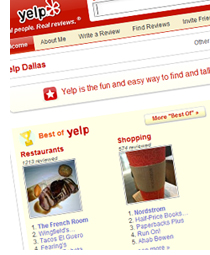I heard a program on the radio the other day where the newscaster was interviewing business owners about how the user-review website Yelp has affected business. The main reaction I heard was fear—fear of a bad review that starts a chain reaction among other Yelp users and a loss of business.
Well, the reality is that reviews have been around for a lot longer than the Internet. In the old days, we called it word-of-mouth. If a customer had a bad experience with a business, he or she would tell friends, and the word would eventually spread.
The only real difference is the speed in which negative news travels over the Web. A customer’s negative experience should be handled no differently than before. It’s still the business owner’s responsibility to respond to the customer and try to right the wrong, and you can!
If you aren’t familiar with Yelp, it’s basically a social website where people can review businesses. It’s really useful if, for example, you are thinking about trying that Italian restaurant you pass every day on your drive to work. Just type in the restaurant’s name into Yelp, and you will find tons of customer reviews and advice to help you decide.
As you can imagine, sometimes the reviews are negative. This happens to just about everyone, but the way a business owner can turn a bad experience around can make all the difference.
With Yelp and other social media platforms, we actually have a great opportunity to right wrongs quicker and more transparently than before. Businesses owners should not shy away from Yelp; it’s OK to log in and start a conversation with someone who had a negative experience with your business.
In fact, Yelp offers business owners a number of tools to track trends and performance. It’s not all about making you look bad!
In my experience, a business that doesn’t care about its customers or offers inferior service will die off no matter what. What Yelp and social media have changed is the speed at which people decide to quit using that business.
One of the advantages of responding to customer feedback on Yelp is that everyone can see what you did. If you make the right moves, you might just earn a bit of respect and intrigue from potential customers. But be careful; don’t overreact or overdo it with cheesy promotions and pandering. That’s not Yelp’s culture, and people will recognize stunts.
Social media brings a lot of challenges for us as business owners, but it also means tons of opportunities to reach out to our customers in unique and positive ways. Yelp isn’t going away, so you might as well embrace it.





